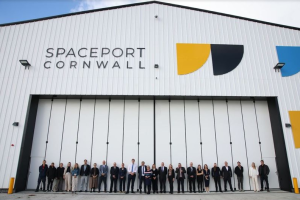OT Interviews: Ross Hulbert, Cornwall Spaceport Head of Engagement
21st Dec 2023
Cornwall Spaceport has held its launch license for just over a year now. The spaceport was in the headlines in the beginning of 2023 with its successful hosting of the Virgin Orbit ‘Start Me Up’ mission – Britain’s first orbital launch attempt. The rocket’s subsequent mechanical failure as well as new activity at the spaceport itself kept it in the news for the first half of the year, but by mid-2023, the limelight had shifted elsewhere.
As 2023 draws to a close, OT had the opportunity to interview Ross Hulbert, Cornwall Spaceport’s Head of Engagement. He shared with us something that perhaps does not draw enough attention while the world looks for the next surge of attention and focuses on upcoming launches, namely: what role does lunch play for Spaceport Cornwall? The answer might surprise you!
So, let Ross Hulbert tell you himself, and read on!
OT: We heard a lot from Spaceport Cornwall in the first half of the year, but it seems that the news flow tapered off. Could you catch us up on what’s happening lately?
Ross Hulbert: The start of the year was the culmination of many years work. So, it was very exciting. In the run up to that, we had announcements all the time, whether it was breaking ground on our buildings or completing the buildings and getting the various licenses.
But we’re in a different phase now. We’re more in a delivery phase. We’ve now got these assets. We opened the SOF, the operations facility, in April. So now, the focus is really on encouraging that ecosystem of businesses.
Our business case for launch is probably a bit different to a traditional spaceport and probably different to the vertical launch sites that they’re building in Scotland at the moment. One difference for us is that we knew launch was always going to be infrequent. Even if you forget about Virgin Orbit for a second, we were looking at probably like one or two launches a year for the first many years of this business case. Our business case was about maximising the impact of that excitement to bring businesses in, to create high value jobs here, which of course is why the local council, Cornwall Council, invested so ambitiously in the project. And that is what we’ve achieved and that’s been successful.
The on-site cluster here of businesses has 13 different businesses based in the operations facility, all offering different sorts of services that are not reliant on launch. A lot of the businesses are enabled by launch, and some of them could become customers of whatever company is launching from here.
But to use a bit of a Cornish analogy, we were always focused on what happens when the tide goes out, when the launch is finished. And we had that big, exciting moment; what actually do we have left here? While that might not be as headline grabbing as doing a launch, the fact that we have meaningful jobs and careers and companies located here is really what the council and even at the national government were investing in.
That’s not to say we won’t do launch as well. We are still progressing in conversations with other operators, and they are still where they were as far as their preparation towards offering commercial services. Their road map to offering commercial services doesn’t magically speed up just because, we’ve potentially got a bit of a gap now with Virgin Orbit having gone bust. But it’s not a problem for us. We have the ability to have these next, probably a couple of years where we can shift focus and we can focus on supporting the ecosystems and businesses that are here while work behind the scenes to enable future launch operators to follow on.
OT: Regarding launch, the spaceport has mentioned Sierra Space and Space Engine Systems as future operators. What’s happening, Ross Hulbert?
Ross Hulbert: I think with Sierra Space, they’re probably going to be our next operator. In addition to the operations facility, we have the integration facility, which is one of our launch critical facilities. There’s a nine-meter-high clean room in there. It’s designed to have customer payloads arrive in it for physical launches. Sierra Space will likely be the next operator to use that facility. The roadmap for working with them is probably 18 months to two years away; that’s neither sped up nor slowed down. They are looking at offering their first mission out of the US in the next few months. and then their attention will turn to international partners.
They’re interested in having a European launch partner. Spaceport Cornwall is the only operational orbital spaceport in Europe, let alone the first licensed spaceport in the UK. And we are beginning to have conversations with DFT, the Department for Transport here in the UK, regarding an amendment to our licence to be able to accept a vehicle like Dream Chaser as an orbital return vehicle. It’s going to be different to the user case that we had for the license for Virgin Orbit. And that’s probably a year to a year-and-a-half process.
This will also involve working with Sierra Space, probably to help find them some European customers. The ConOps [Concept of Operations – ed.] study that we’ve already conducted with them shows that Dream Chaser can safely return to Spaceport Cornwall. That’s not to say it will if they’ve not got any customers. It’s not a science experiment, is it? They will offer it if there’s a commercial reason to use Spaceport Cornwall. And they’re working with partners in Japan as well, and that’s progressing quite nicely. So that’s probably the next meaningful launch operator.
And then you mentioned Space Engine Systems. So they were doing some testing here a bit earlier. They are now in a position where they’ve done a lot of their engine testing out in Canada and in the US, and they are soon to be using that engine in an airframe. So, this series of space planes that they’re developing, the first demonstrator they have in the process of submitting their paperwork because a lot of their technology is ITAR restricted. They’ll have to go through the process of ensuring that is safely transferred over and doesn’t get stuck in customs.
Obviously, we do want to be doing launch-related stuff. That’s what gets people excited. when they come to a spaceport. They expect to hear the roaring of engines and stuff happening. Sierra Space, they’re in the process of recruiting some locally based people. and I think that will be, again, like while we work on the maybe less glamorous side of the supporting the ecosystem and doing the things that pays the bills.
Space engine systems will be a good one as far as supporting the activity that gets everybody excited. Again, we’ll use that excitement in order to hopefully bring more companies in and to do things and collaborate. but their program will involve doing some test flights in the next year, 18 months. and again, part of our offer and service for them is to help engage with the regulator and some changes to what they’re trying to do. So, again, that’s all still progressing really nicely. And they’re getting lots of good traction. They’re starting to employ people across their business development, not just their R&D side. So they are moving in the right direction as well.
OT: You mentioned that the spaceport will need to have some changes to your licensing. Is there going to be much of a change in the environmental impact studies that need to be done? What changes need to be taken, Ross Hulbert?
Ross Hulbert: That will be part of the conversation that we have with DFT. With Sierra Space, there is a sonic boom, which there wasn’t with Cosmic Girl, obviously. So that will all be part of that conversation. And that’s one of the reasons why it feels like it takes such a long time. It’s because there’s all these other elements that come in as well.
And we’re speaking to other operators as well. The tricky thing is that, for instance, initially, when we were under NDA with Virgin Orbit, we couldn’t go out to the market and say, “oh, we’ve signed up this operator”, which is obviously so important for a spaceport, because until you have an operator, you’re essentially just an airport. So, we are under NDA with another three or four horizontal launch operators. And it’s a strange one because it’s not hugely secretive because the companies who those would be, it’s all in the public domain. But it’s not for us to be going out announcing before they’re ready to say who we’re talking to.
Ross Hulbert: Again, they complement quite nicely along as well. So we’re working with people who are maybe two, three, four, five years away. They’ll all come on gradually. Of course, space is risky, and some of them may never get there. But we’re not in the business of picking winners. We’re just supporting people, any way we can, and giving them a credible route to launch, because we’ve done it. We’ve got the licenses, we’ve got the operational experience. so that’s of real interest when people are thinking that they might be talking to other areas and that space is something that they intend to do or is an ambition. Whilst for us, although we don’t anticipate having a launch for another two years, if a Virgin Orbit style company just appeared out of nowhere and just turned up at the office, we could facilitate a launch much sooner. It’s just more about the commercial realities of where most businesses are at the moment.
OT: You’ve mentioned that, if suddenly out of the blue, another Virgin Orbit style company came around, you could prepare the services that they would need. But, what does this mean in terms of mothballing the equipment that’s sitting around? Is there anything outside of a normal airport, anything that needs to be done to keep the place in readiness? And how much does it cost?
Ross Hulbert: So, the way that we were able to be, in some terms, so far ahead of the other UK spaceports, is that we were the only ones to use what we call a Delta model. We’re just adding another service on top of what is already an operational aerodrome. As far as the launch critical facility for the customers to actually put their satellites into the vehicle, clearly that was something that we needed to offer, although technically that could have that could have been done in Long Beach with Virgin Orbit, for example. But again, there was an opportunity for us to invest in a facility which enables people to come here much earlier into the launch campaign, which is good for Cornwall and captures more economic opportunity for us.
As far as keeping those facilities, there’s the integration facility. That’s not going to be used for launch activity for a couple of years, but it costs us money to have it there empty and not doing launches out of it. So, we are talking to a company at the moment who are looking to rent that facility from the beginning of the year. It’s not going to be a SpaceX activity, but it will help pay the bills, over the next two years. It’s a temporary solution for that company. They know that they can’t be in there for longer than 18 months, and it doesn’t make sense not to do it.
We get a lot of school groups up, and our education outreach program is immensely important to us. Everybody wants to come and visit a spaceport, but it can’t really justify keeping that enormous, great big building empty just to bring school groups through. We will have things for people to come and see. The UK Space Agency built their Launcher One model rocket, which went on a nationwide tour and is now back here at Spaceport Cornwall. We’re hoping it will be the start of a dedicated visitor experience on-site. And we’ve got other plans in process. So, the spaceport team is in the process of being moved or is now part of the airport, which is again not a very exciting process, but it enables us to be a bit more strategic about the things that we can invest in on-site to get people up here.
So that facility will be being used by a non-traditional launch company for the next 18 months. And then by the time we’re working with Sierra Space, at a point when they need access to the rocket or what we call the rocket end or the Dreamchaser, it could be a hangar, at a point where they would be looking to take payloads off Dreamchaser and put them into some post-mission analysis facility where they have the clean room available for that. The facility is definitely not getting blocked by anybody else or turned into something else.
Actually, it’s not so much about the facilities, but about our operational capability. It’s that a lot of the companies I mentioned, we can’t name a lot of these smaller horizontal launch developers that we’re working with. A lot of them are coming more from the future flight side of things or even Airspace 2.0 or whatever you want to call it. So, we are working alongside those companies to see where we can help support that. And that might be companies who are developing unmanned technology, which, at the moment, of course, you can’t operate out of a licensed passenger airport. Nor can you do that anywhere in the world at a licensed passenger airport. But the anticipation is that within in the medium term, that regulation probably will exist. There’s another airfield pretty close to Goonhilly called Predannack and that has been working recently as an unmanned systems centre of excellence. So there’s a lot of companies being attracted to Cornwall to test out and develop their technology with the anticipation that maybe in the next five years, when we’ve got mixed airspace, they will also be able to offer commercial services out of Newquay. So again, the runway doesn’t magically disappear. We’re blessed with this, this 2744 meter long runway, which is because we’ve got the RAF base as well. So, while we don’t need the integration facility for that. There will be other testing regimes and R&D going on behind the scenes as well. And again, that part is the activity we should be hosting. Being the only operational spaceport around, anyone that is looking to do any of that activity in Europe is going to come here. And again, it’s activity that we can do now, while there isn’t a headline launch campaign going on.
OT: A lot of funding has been going lately to the prospective vertical launch sites. Because you’ve already got a running site, do you really need any more help from them financially or in that direction? Is there something else that you would like to put up that would require an investment from them? How is the national government really helping to keep things moving?
Ross Hulbert: The national government obviously supported us in the run up to our launches. When we did the first launch in January, obviously we didn’t need as much physical infrastructure as a vertical launch site. That’s part of our cost-effective offer for launch. We are talking to the UK Space Agency, and government agencies such as the Department for Transport, where they might be able to help us with funding some concept operations studies for some of these different systems.
We have to ask, what is a company’s technology requirement? We found with Virgin Orbit, who had been launching successfully out of the US many times before coming here, you can’t just assume that everything is just going to translate over perfectly. So that is somewhere where they might be able to help us do some funding on, like the different use cases for things we want to do.
But there’s a lot of milestones happening in Scotland at the moment. And, that is really, really exciting. I chaired the launch panel at the UK Space Agency a couple of weeks ago, and Astraius were on the panel. Skyrora was on the panel. Matt Archer, the director of Space Flight for the UK Space Agency, was on the panel. And it was quite a nice way to bookend the year really. We started off by achieving the first launch in January. The satellites weren’t successful in getting to orbit but the spaceport worked properly 100%.
It was nice to be able to get a bit of an update from them about where they are and what their next 12 to 24 months are going to look like. They have our utmost support. There’s never been any competition or infighting amongst the spaceports in the UK. We’re all working in very different parts of the market. And we’ll be supporting those guys as they were supporting us when we had our first launch. So, I’m really excited to see what’s going to be going on in Scotland over the next year or two.
Orbital Today would like to thank Ross Hulbert for taking the time to speak with us about the vision for the spaceport!






Thank you for your comment! It will be visible on the site after moderation.